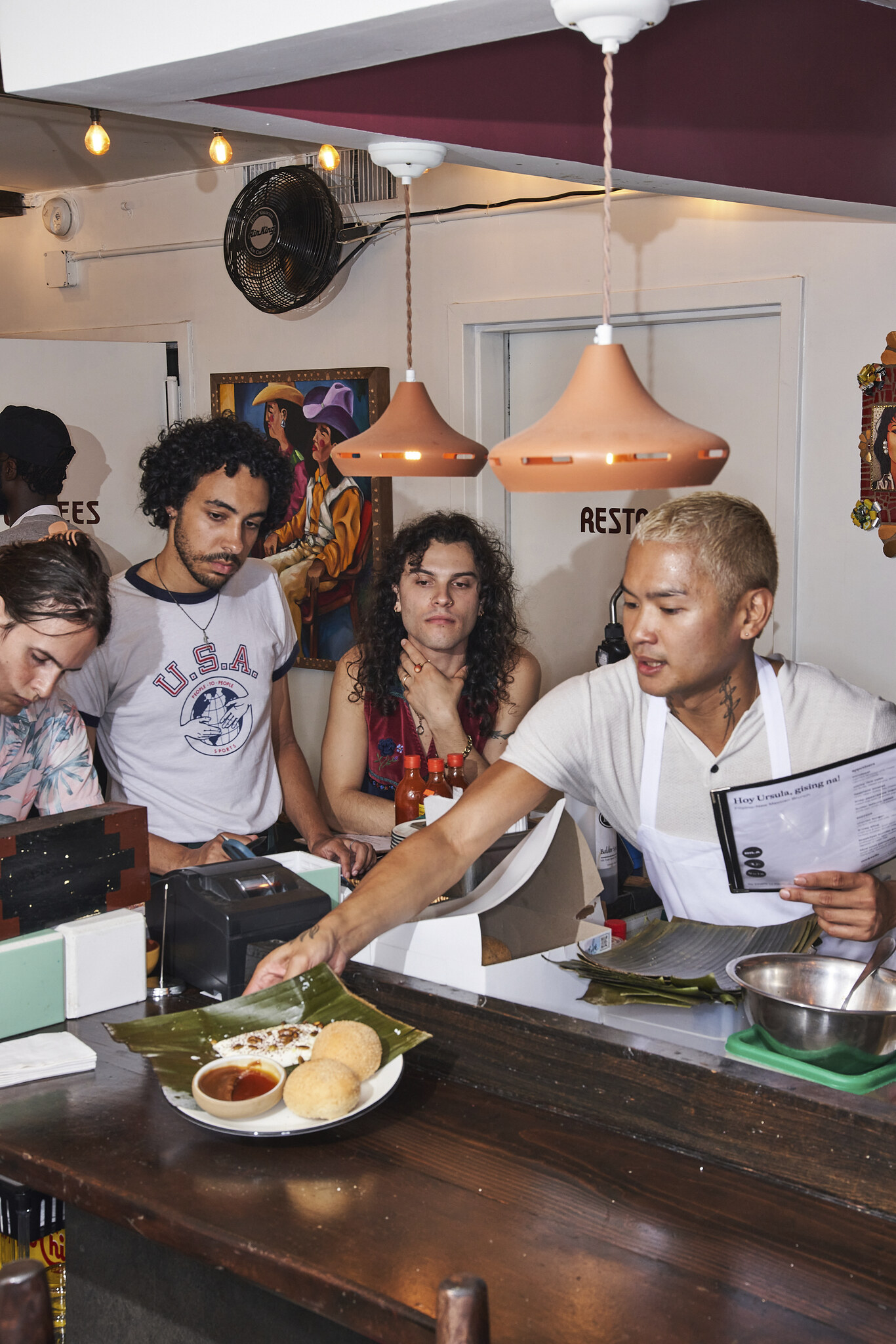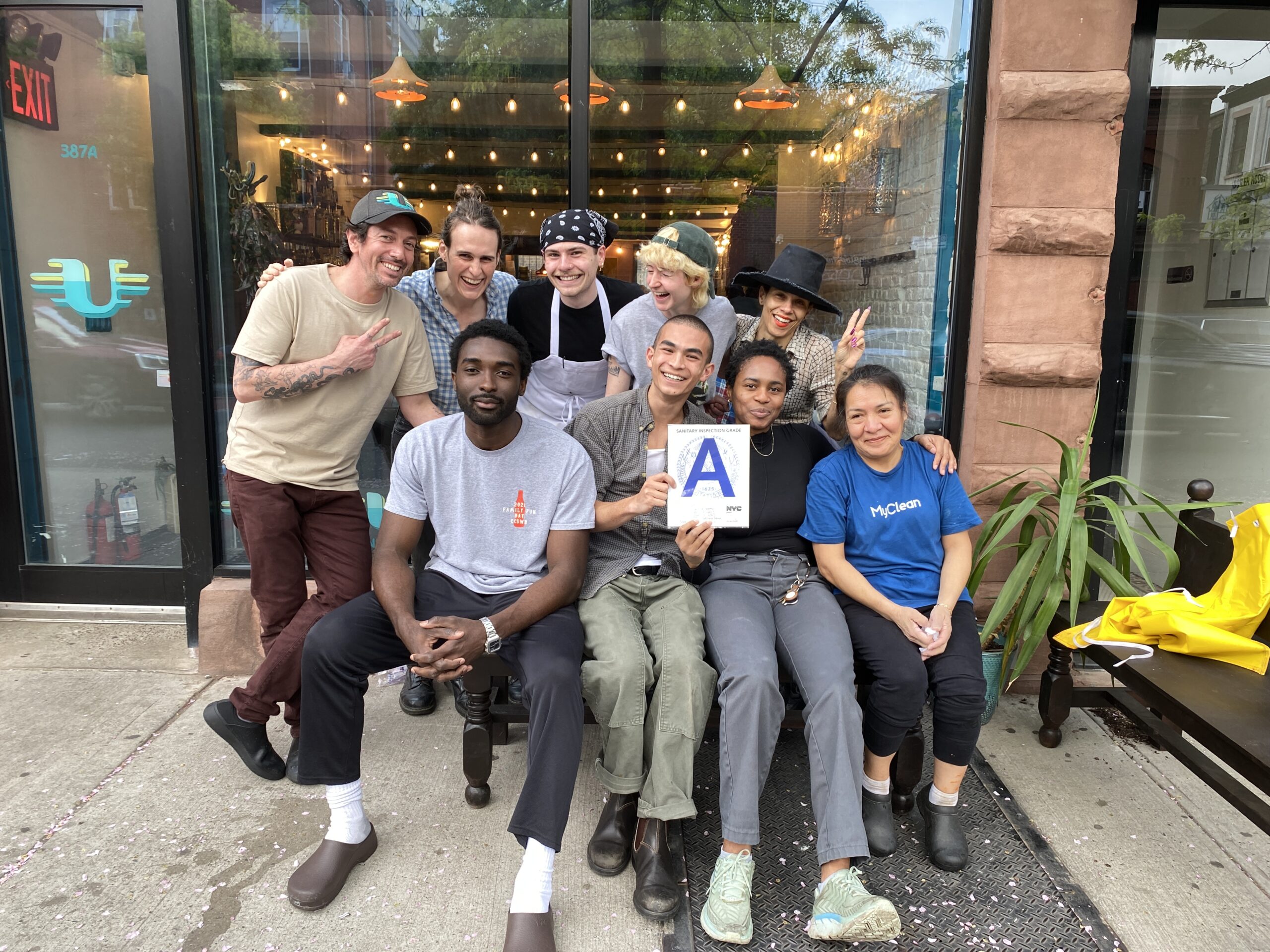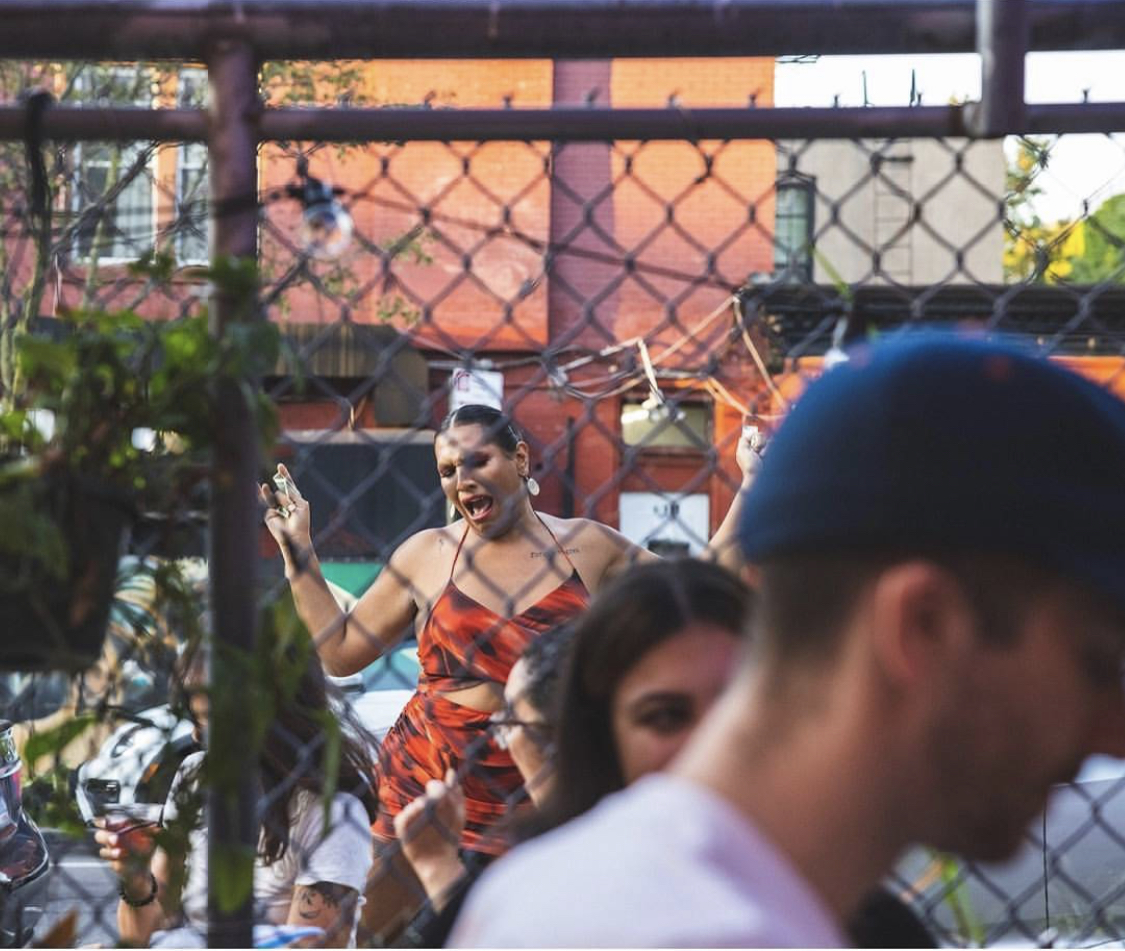A few hours before his flight, Eric See sits in the backyard of his newly expanded Bedford Stuyvesant restaurant, Ursula, his phone lighting up with notifications every few minutes and his doberman Luka at his feet. The Brooklyn-based chef is leaving soon for New Mexico, where he’s picking up 1,500 pounds of green chiles and driving them back in a van. He’ll have to stop frequently to rotate the delicacies in order to keep them cool, but he’s not stressing. He’s done this trip before, and his Dad is tagging along to help.
See is preparing to host the New Mexican Chile Roast on September 5, at The Meat Hook butcher shop in Williamsburg. Freshly roasted peppers will be for sale at the event and American Culinary Corps Chef Bleu Adams will serve them up in fry bread Navajo Tacos as a mariachi band performs.
Known for its balanced heat and sweetness, the green chile embedded in New Mexican cuisine is the star of See’s beloved breakfast burrito, which attracts hangry locals and foodie tourists alike.
“It literally runs through our blood,” See says of the coveted vegetable.

Courtesy of Ursula.
From late summer to early fall, the streets of New Mexico are overpowered by the smell of green chiles barrel roasting in supermarket parking lots for customers who scoop them up to freeze for the rest of the year.
“Ursula has been, from its inception, a celebration of the intersections of my identity, of queerness, and of New Mexican heritage,” See says.
The two-time James Beard Award nominated chef, who opened Ursula after COVID forced him to close the doors of his Bushwick bakery, Awkward Scone, prioritizes fostering unique cultural experiences while serving delicious food.
During morning hours the line stretches down the block while See serves dishes inspired by his culture and upbringing but with a twist. His chile sangwiches are stuffed with fried chicken; the poblano relleno has quinoa; pancakes are made with blue corn batter; and the arroz con leche is infused with jasmine.
“Food is not static in the way that language is not, it evolves and it shifts,” he says. “We’re working to both educate, represent, and serve some things that are traditional.”
Ursula was built on a desire to honor See’s complex heritage and pay homage to his family’s Indigenous, Mexican, and Spanish lineage, which can be traced back through New Mexico, spanning the last 400 years, across shifting borders and forced displacement.
The upcoming chile roast is an opportunity to highlight the rich history of the American Southwest’s Indigenous routes, See explains. His restaurant sources chiles from New Mexico year-round, along with blue corn and beans grown on Navajo-owned farms in the state.“It’s important to maintain an economic cycle with the communities that have created the cuisine,” See says.
- Ursula staff roasting chiles. Courtesy of Ursula.
Reinvesting in the community is one of the key pillars at Ursula; currently 90% of the staff identify as queer. And See has earned a reputation in the industry for uplifting advocacy efforts that support marginalized groups. While working as a pastry chef at Locanda Verde in 2016, See sold his Italian rainbow cookies at the Hester Street Fair to benefit the victims of the Pulse Shooting in Orlando, Florida. Then once he had his own storefront, See continued selling the cookies, donating part of the proceeds to queer organizations, including Immigration Equality and the Ali Forney Center.
Giving back has served See well; his community has his back, too. Meeting Claire Sprouse, the owner of the now-closed Hunky Dory, while doing mutual aid distribution work led See to secure Ursula’s original Crown Heights space where the restaurant launched as a mostly take-out operation in fall 2020. Since then, the restaurant has successfully crowd-funded several times to stay afloat.
“I’ve always felt that it was very important to utilize your privilege to reallocate those resources within your community,” See says.
The queer community’s chef darling is continuing to share his platform as he gains industry recognition and lands spots on coveted ‘best of’ lists. Since Ursula moved to a bigger space in April, one of his baristas started a queer movie night screening films from Drop Dead Gorgeous to Clue in the backyard, and the restaurant has invited various guest chefs to take over the kitchen. Earlier this summer, the Caribbean restaurant Aunts et Uncles Flatbush served a vegan ackee saltfish and plantain breakfast burrito, alongside a mezcal roasted banana and nutmeg-infused daiquiri, with proceeds benefiting Love Wins Food Pantry.
The Bedford Stuyvesant location comfortably seats over 50 guests and has let See expand the drink menu to include spirits from queer, Black, femme, POC, Indigenous, and worker-cooperative-owned companies. While supporting smaller brands sometimes comes with higher prices, See hopes that placing brand bios in drink descriptions will help customers feel better about, say, spending $30 for a Mezcal Mauthia cocktail produced with ancestral techniques.

Courtesy of Ursula.
In general, price points at the restaurant and for affiliated events are set with the rapidly changing economic disparity in its predominantly Black neighborhood in mind. See strives to provide food that community members can afford — the New Chile Roast will hold a number of sliding-scale tickets for BIPOC and LGBTQ guests.
“There’s more money coming into the neighborhood, but I also don’t want to dissuade people that aren’t from this new wave of gentrification from being able to come in and afford our food,” See says. “Even within the [queer] community, we’re not an economic monolith.”
More than 22% of LGBTQ adults are living in poverty, compared to an estimated 16% of their straight and cisgender counterparts. What’s more, LGBTQ+ workers earn about 90 cents for every dollar that the typical worker earns, with queer people of color, trans and non-binary people earning even less.
Ursula’s dedication to promoting equity isn’t only external, as See works to implement socially and environmentally sustainable practices inside his own shop as well. After paying his dues for over a decade in New York City’s food scene, at times taking home $8 an hour for 7-day-a-week jobs, he wanted to create a business model that fosters a legal and fair work environment.
“I think that some owners act out of fear and that manifests itself in really unfair labor practices,” he says.
A company policy uncommon in hospitality, Ursula closes for a week in August and December to promote staff well-being and mental health. See also tries to be transparent with his team about the restaurant’s pay model.

See (left) with Ursula staff.
“I’m not gonna retire off of this,” he says. Once the restaurant can turn a profit the plan is to reinvest it into staff bonuses.
Compared to other workplaces, Ursula cook and barista Maia Hernandez, who worked in construction before entering the restaurant industry, said she finds comfort at the restaurant knowing their coworkers are committed to protecting each other.
“We’re often encouraged to just be ourselves at work; [it’s] nice to not have to tone it down,” they said.
Ursula staff have no problem kicking out customers who discriminate against staff or make them feel uncomfortable, according to Hernandez.
“It’s easy to talk and be like, ‘we’re an inclusive environment,’ but it’s another thing to actually put your money where your mouth is,” they added.
Leah Rodriguez is a writer living in New York City covering food, culture and women’s rights.











